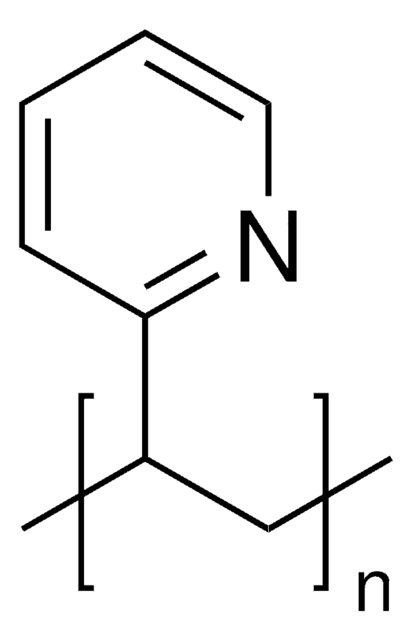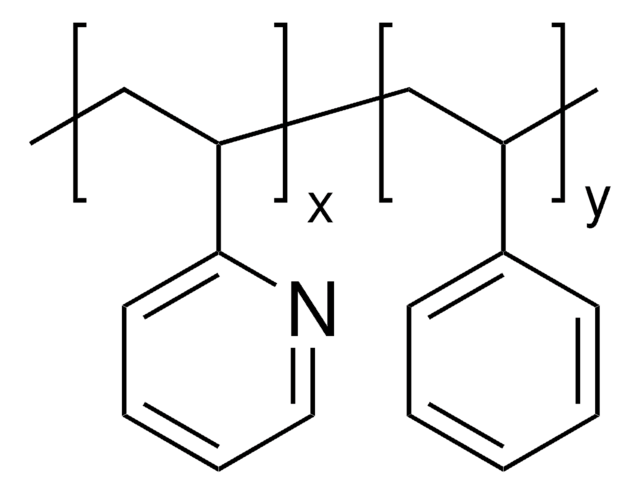523321
Poly(2-vinylpyridine)
analytical standard, average Mw 37,500 (Typical), average Mn 35,000 (Typical)
Sign Into View Organizational & Contract Pricing
All Photos(1)
About This Item
Recommended Products
grade
analytical standard
Quality Level
mol wt
average Mn 35,000 (Typical)
average Mw 37,500 (Typical)
technique(s)
gel permeation chromatography (GPC): suitable
format
neat
InChI
1S/C7H7N/c1-2-7-5-3-4-6-8-7/h2-6H,1H2
InChI key
KGIGUEBEKRSTEW-UHFFFAOYSA-N
Looking for similar products? Visit Product Comparison Guide
Application
- Synthesis and Structural Insight into Poly(dimethylsiloxane)-b-Poly(2-vinylpyridine) Copolymers: This study delves into the synthesis of poly(dimethylsiloxane)-b-poly(2-vinylpyridine) copolymers, highlighting their structural characteristics and potential applications in creating hybrid materials with unique properties (Avgeropoulos et al., 2023).
- pH Tunable Patterning of Quantum Dots: Research discusses the utilization of poly(2-vinylpyridine) in pH-sensitive patterning for quantum dot arrays, offering a versatile approach for developing advanced photonic devices (Onses et al., 2024).
- Dynamic Photonic Janus Colloids with Axially Stacked Structural Layers: The study presents the application of poly(2-vinylpyridine) in the formation of dynamic photonic Janus colloids, which could lead to innovative solutions in sensor technologies and display systems (Ku et al., 2024).
- Polyhedral Colloidal Clusters Assembled from Amphiphilic Nanoparticles in Deformable Droplets: Demonstrates the role of poly(2-vinylpyridine) in assembling complex colloidal structures, which may be crucial for the development of novel biomaterials and drug delivery systems (Jiang et al., 2023).
Signal Word
Warning
Hazard Statements
Precautionary Statements
Hazard Classifications
Eye Irrit. 2 - Skin Irrit. 2 - STOT SE 3
Target Organs
Respiratory system
Storage Class Code
11 - Combustible Solids
WGK
WGK 3
Flash Point(F)
Not applicable
Flash Point(C)
Not applicable
Personal Protective Equipment
dust mask type N95 (US), Eyeshields, Gloves
Choose from one of the most recent versions:
Already Own This Product?
Find documentation for the products that you have recently purchased in the Document Library.
Customers Also Viewed
Astrid Drechsler et al.
Langmuir : the ACS journal of surfaces and colloids, 28(44), 15555-15565 (2012-10-13)
AFM force measurements have been performed to study the influence of the pH value and salt concentration on the interactions between poly(2-vinyl pyridine) brushes and microsized silica spheres, focusing on attractive and adhesion forces. It was found that the interaction
Zhiquan Chen et al.
Langmuir : the ACS journal of surfaces and colloids, 26(11), 8869-8874 (2010-04-15)
We reported the deliberate control on the micelle opening and closing of amphiphilic polystyrene-block-poly(2-vinylpyridine) (PS-b-P2VP) micellar films by exposing them to selective solvents. We first treated the micellar films with polar solvents including ethanol and water (pH = 4, 8
Oleksandr Trotsenko et al.
Langmuir : the ACS journal of surfaces and colloids, 28(14), 6037-6044 (2012-03-15)
Conformations of cationic polyelectrolytes (PEs), a weak poly(2-vinylpyridine) (P2VP) and a strong poly(N-methyl-2-vinylpyridinium iodide) (qP2VP), adsorbed on mica from saline solutions in the presence of counterions of different valences are studied using in situ atomic force microscopy (AFM). Quantitative characteristics
Kaizhong Fan et al.
Journal of colloid and interface science, 344(1), 112-116 (2010-01-20)
The interaction between negatively charged organic salts, with one two and three sulfonate groups respectively, and positively charged poly(2-vinylpyridine) microgel particles has been investigated. Absorption isotherms are used to describe the uptake of organic salt into the microgel network and
Lung-Chi Chen et al.
Chemical communications (Cambridge, England), 48(30), 3668-3670 (2012-03-08)
Stereoregular vinyl polymers, poly(2-vinyl pyridine)s (P2VPs), were synthesized to examine the tacticity effect on the induced circular dichroism (ICD) via association with chiral acids. The ICD was found to be strongly dependent on the isotacticity of the P2VPs and the
Our team of scientists has experience in all areas of research including Life Science, Material Science, Chemical Synthesis, Chromatography, Analytical and many others.
Contact Technical Service









